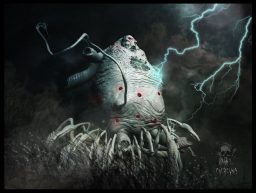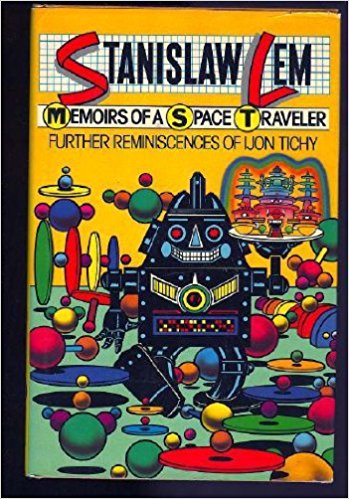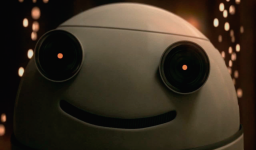 I was recently pondering why certain works of science fiction horror, whether employing the written word or the moving picture, appeal to me, and others do not. This is slightly different than asking what makes a good or bad book, because horror works more on the emotions. Either it succeeds in forming a memorable, strong emotion, or it doesn’t. And neither rich, flowery prose nor perfect cinemaphotography are as valuable here as they are, for instance, in a drama. Ultimately, I came up with two central elements that unsuccessful works invariably fail to fulfill. The effective written stories pass both and the good cinematic works satisfy one, being an intrinsically more shallow medium.
I was recently pondering why certain works of science fiction horror, whether employing the written word or the moving picture, appeal to me, and others do not. This is slightly different than asking what makes a good or bad book, because horror works more on the emotions. Either it succeeds in forming a memorable, strong emotion, or it doesn’t. And neither rich, flowery prose nor perfect cinemaphotography are as valuable here as they are, for instance, in a drama. Ultimately, I came up with two central elements that unsuccessful works invariably fail to fulfill. The effective written stories pass both and the good cinematic works satisfy one, being an intrinsically more shallow medium.
- A logical series of events and explanations.
- A novel, interesting idea.
At first, this might seem painfully obvious or unhelpful. However, there is more nuance here than meets the eye. Notice I wrote logical for point 1, not plausible. Science fiction horror can be completely unhinged from our reality, but it has to make sense within its world and rules. And consider how many movies and even books can be wonderful fun and very good works without requiring point 2. They simply do an excellent job of executing a standard, even hackneyed concept. But with science fiction horror, it’s vital to the story’s success.
Now, I will consider two stories (one a book, one a movie) which I didn’t care for and two I like very much.
The Unsuccessful
I Have No Mouth, and I Must Scream– This story made very little impression upon me and I have been scratching my head at its popularity ever since. Even among Ellison’s own science fiction horror works, this is weak. The story he co-authored with Robert Sheckley, I See a Man Sitting on a Chair, and the Chair Is Biting His Leg, is many times better, and a genuinely excellent tale.
One problem I have is that I never found the sequence of events logical. Why would the supercomputer decide to kill all but five humans? Why not leave fifty? Why would it develop the very human emotion of a sadistic streak? Why would such a powerful being, with reactions measured in nanoseconds, fall asleep on its lone, simple job, allowing humans to successfully commit suicide?
Thus, I’m already skeptical, which is a bad emotion for fully engaging with a work’s horror themes. And then, the story also fails the second criteria, that of offering an interesting idea. A supercomputer torturing humans? That’s something a ten year-old can come up with. And the tortures themselves aren’t even especially interesting. They’re quite mundane and not particularly horrific. Also, couldn’t a supercomputer hook up its censors to the brains of its subjects and cause unbearable agony and pain through the parts it touches, and the visions it creates? Why go through all the trouble of changing the weather? Far from feeling dread, this story, while well-told, and competent enough, inspired confusion and a degree of derision.
Event Horizon– Another work that had limited effect on me, although its appeal is more understandable. It stars good actors and features several horrifying visual images. Unfortunately, neither the acting nor the sight scares make up for how poor the story is. There is no logic to any of the proceedings, which are mere plot contrivances stacked on top of one another. And original ideas? Forget it. If the science fiction is all bunk, then the horror is hokey.
The Successful
Memoirs of a Space Traveler (Ijon Tichy #2)– This collection of short stories by Stanislaw Lem is superb, and also features the best science fiction horror I’ve come across. Among it’s classics is Professor’s Corcoran’s creation of a universe experienced by iron boxes attached to wires and stimuli. The “humans” are in reality nodes on the iron box, nothing more. This passes the logic test, as artificial reality becomes more and more immersive. Why can’t sight, sound, touch, and all the other senses be evoked in such a manner? Who is to say this doesn’t describe our own universe?

A remarkably cheery cover given its contents, including the referenced story with the black robots.
For 1982, well before The Matrix, this is also quite creative. But there are further details that push the story beyond that benchmark and give it a particularly eerie, haunting quality. It’s mentioned that there are occasional aberrations or clues in this iron box universe, and a few of the “people” pick up on it. They reveal these views, and are punished by their societies as dangerous lunatics, dying in torment. Professor Corcoran could validate or help them, but in so doing, would usurp his own power as a silent deity. It’s a science fiction short story that few will forget.
Another excellent work of science fiction horror from the same collection is Professor Decantor’s creation of the soul. It seems like a very simple, silly idea, which is how Tichy first treats it as well. But then, when one grasps the full significance and consequences of the actions, it’s more shocking and terrible than any torture that a supercomputer can come up with in thousands of years. While the idea of constructing a soul seems implausible, everything that follows from that initial step is cause-and-effect, giving it a chilling logic. And the idea itself, while simple, is a novel one I haven’t encountered anywhere else.

Great science fiction writer, polymath, cheery fellow, and…master of horror?
Blinky (Bad Robot)– Watch the short film here. At first, this seems like just another killer robot story. Hell, it’s mentioned in the title! But beyond Ruairí Robinson’s fine direction and presentation, it’s a logical story. A seemingly kind robot doesn’t suddenly turn deranged and murderous out of nowhere. Here, the progression is accomplished through a series of events experienced by the robot, all reasonably leading towards the murderous AI finale. No, it’s not a particularly unique idea. But as mentioned previously, movies are an intrinsically shallower medium that doesn’t require as much intellectual depth. (And I write this as an enormous movie lover my whole life) The logic is strong enough that I’m fully engaged with the horrific scenes I watch instead of questioning it.
Anywho, what other elements do the readers consider vital to a successful work of science fiction horror?

You can always tell the murder robots by their smiles!
Science Fiction is the perfect genre for Horror, other than Horror. Horror is all about the return of the oppressed moral order, the Monster is the moral order returning and exerting itself. Frankenstein, Freddy Kruger, Jason, all represent the return of the Moral Order and the consequences that come from that. There’s a reason Jason doesn’t kill Jamie Lee Curtis (and it’s not that such a fine rack should be spared his knife, though I can see that point of view), Jason spares her because, she did not violate the Moral Order. SciFi is perfect for Horror (see, Alien) because, most SciFi is little more than rationalized misbehavior, SciFi reflects and advances modernity, while Fantasy reflects and advances Humanism. The problem SciFi faces in doing Horror is, to be true, to write good Horror, it must write against itself. No, SciFi writer today (excepting,JCW) is capable of that.
I’m split on Ijon Tichy, and with how schizophrenic the tone was, I can totes get why PKD thought Lem was a KGB psy-op instead of a real person, but when he was doing SF mad science horror, he was on.
Who better than someone running a KGB psy-op to write horror?
Is Science Fiction Horror the same as Weird Fiction or is there a difference? Also what would make a good Weird Story?
Let’s not forget the man who made the most effective fusion of SF and horror, revolutionizing both: Howard Phillips Lovecraft his own bad self.
Pace Mr. Keenan, I think Lovecraft found SF an effective mode for horror precisely because there is no moral order. There’s nothing wrong with hunting for fossils in Antarctica . . . but the revived Elder Things and shoggoths will get you anyway. To me, that’s true horror, with no comforting “they shouldn’t have done that” lesson attached.
-
Lovecraft was an interesting character, all writers write about what they know, so did Lovecraft. I believe Lovecraft wrote about his neurosis, projecting them outward. The elder gods, the others, returning and overwhelming good people, parallels his fear of immigrants for example. The whole idea of reality being overwhelmed by the outsider is basically his fear of immigrants writ large.
-
“neurosis”
Hey Freud were residents of Rotherham’s suburbs neurotic for voting overwhelmingly for BREXIT?
Irregardless I have only read a little of Lovecraft’s work but from that small bit i can already tell you have no idea what you are talking about.
Lovecraft was a prolific. not only in fiction but in letters and in criticism. I don’t know but i am going to take a guess that the amount he actually wrote about “muh immigrants” takes up less then 1% of the total.
Yet that is what you are basing your shrinking of him on. Not the existential horror of an uncaring cosmos which every critic or fan of his has described as its bases for 80 or so years and not from, you know, what Lovecraft actually wrote describing where and from whom his Cosmic Horror “basically” came from.
to wit:
http://www.hplovecraft.com/writings/texts/essays/shil.aspx
Heck check out how he starts it:
“The oldest and strongest emotion of mankind is fear, and the oldest and strongest kind of fear is fear of the unknown.”
Lovecraft knew full well the history of immigrants through the ages. He was well read. Probably even knew who the Goths were.
Also he probably read the paper along with the police blotter.
No speck of unknown for him in regards to immigrants. Yet, contra your claims, says large ‘the greatest fear comes from the unknown’.
Seems more obtuse, almost perpendicular, than parallel there Joe.
-
In today’s parlance Lovecraft was a “racist.” That’s really an inadequate description though, and it is very unfair. He disliked anyone not like him. This wasn’t just a racial thing, it was religious as well, he didn’t like Catholics for example. His “racism” was laid out in numerous letter with Robert E. Howard, it’s not really debatable. Lovecraft was not a well adjusted man, if he was alive today (besides being very old), he would probably be one of those internet guys that screeches at the world as he lives in his parents basement. I believe his fear of “the other” is expressed in the return of the Elder Gods; something from “out there” is “coming here” and it’s going to ruin everything.
-
Regarding Fraud, I’m no Fraudian. Regarding the voters of Rotherham, no, I don’t believe they were neurotic for voting Brexit. I do think Brexit is an example of the return of the repressed though, the repressed in this case being the English working class. Brexit was the beginning of the Hobbits cleaning up The Shire. That’s not over yet as Sharky hasn’t paid for his perfidy yet.
-
-
What if Lovecraft didn’t know any immigrants, but did know a bunch of smart neurotic artsy types? All writers struggle with their limited talent. What if Lovecraft basically wrote about smart artsy neurotics being inevitably overwhelmed by the uncaring eldrich force of their limited talent?
Lovecraft was a good Golden Age SF writer whose characters responded to alien societies with stark horror, like Bernal Diaz, instead of ‘shoot Bug Eyed Monster, honk hooters’ like Captain John Smith. Good gig, till his market slowed.
Then he slowly starved to death while corresponding with fans. Not an unusual career arc for a writer.
-
Regarding immigrants, his dislike for them is well known; his correspondence with Howard for example. Towards your point regarding, “…Lovecraft basically wrote about smart artsy neurotics being inevitably overwhelmed by the uncaring eldrich force of their limited talent?” that’s very insightful!He would then be beset by powerful internal and external fears, the external threat being the coming of the “others,” and the internal fear being his own deep seated fear of inadequacy, of a fear of being exposed as a no talent. There’s a lot there that could be developed!
Melding Science Fiction and Horror involves following two divergent–though not quite contradictory–sets of rules.
Science Fiction requires the illusion of possibility. I don’t want to get into the Hard/Soft argument here, but in order to qualify as SF I feel that a work needs to be based upon a rationalist metaphysic. There are inviolate rules by which the cosmos operates, and those rules can be exploited in some sense.
Horror, on the other hand is predicated upon fear of the unknown and an environment of uncertainty.
Reconciling those two viewpoints–an orderly cosmos giving rise to an uncertain locality–can be done, however. The usual theme of SF/Horror is hubris. The typical Creature Feature of the 1950s and 1960s involved scientists who lost control of their creations because they didn’t understand science as well as they thought they did.
In my opinion Michael Crichton was one of the masters of SF/Horror, although he’s not usually recognized as a horror writer. Still, what else would you call “Jurassic Park” or “The Andromeda Strain”?
Another name not usually associated with either genre is Irwin Allen. “The Towering Inferno” and “The Poseidon Adventure”, for example, can be viewed as horror films where the man-made structures are the monsters. “The Swarm” is another film that highlights the dangers of hubris–the bees were, if you recall, deliberately imported from Africa to South America.
-
One genre often bleeds over into another, Inferno and Poseidon adventure are to me suspense, not horror, though there is an element of horror in it. You’re spot on regarding hubris though, be in Frankenstein, or, Them, man transgress a boundary, the moral order is violated, and everyone, even the innocent, pay a price for it. The Monster becomes the avenging force in Frankenstein, giant ants in Them.
-
“Science Fiction requires the illusion of possibility. I don’t want to get into the Hard/Soft argument here, but in order to qualify as SF I feel that a work needs to be based upon a rationalist metaphysic. There are inviolate rules by which the cosmos operates, and those rules can be exploited in some sense.”
You know, it just dawned on me that the same “science” is at play in Kline’s Venus trilogy as in Lovecraft’s Whisperer in the Darkness. Only while in Lovecraft’s story, the mind transference across space and aeons resulted in aliens tainting the integrity of academia, Kline’s mind transference was an excuse to communicate with and send people to planets during a time in solar evolution that Mars and Venus could support life.
-
Methinks that it is “The Shadow Out Of Time” that you want!
-
Concerning that “philosophical” horror as seen in the Lem stories you have mentioned, I’d say that “Blindsight” would count as a pretty effective crystallization of that.
Lem’s Ijon Tichy story about Professor Corcoran was first published in Polish in 1961, as was his Ijon Tichy story about Professor Decantor.
Other good Lem stories that can be considered horror include “The Twenty-First Voyage of Ijon Tichy” (1971, found in English in The Star Diaries), “Doctor Diagoras” (1964, found in English in Memoirs of a Space Traveler), and “Non Serviam” (1971, in A Perfect Vacuum).